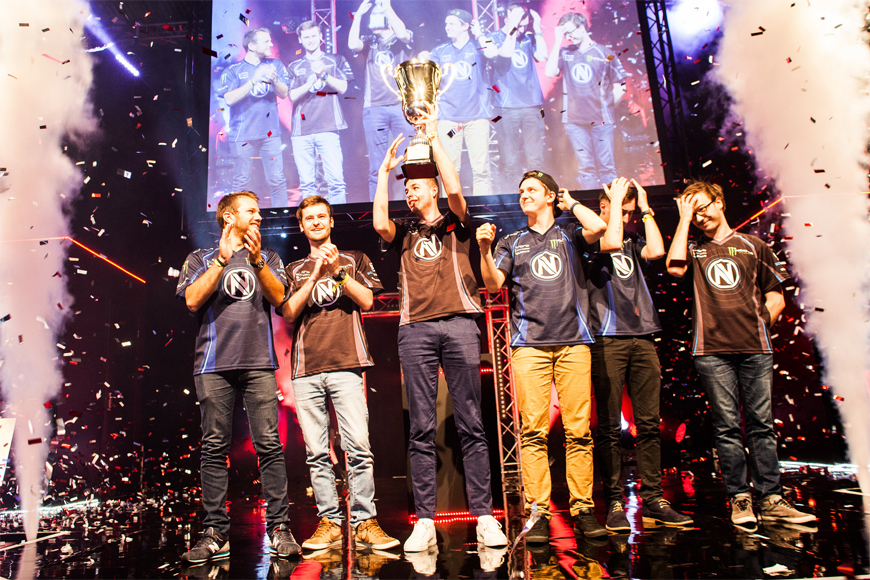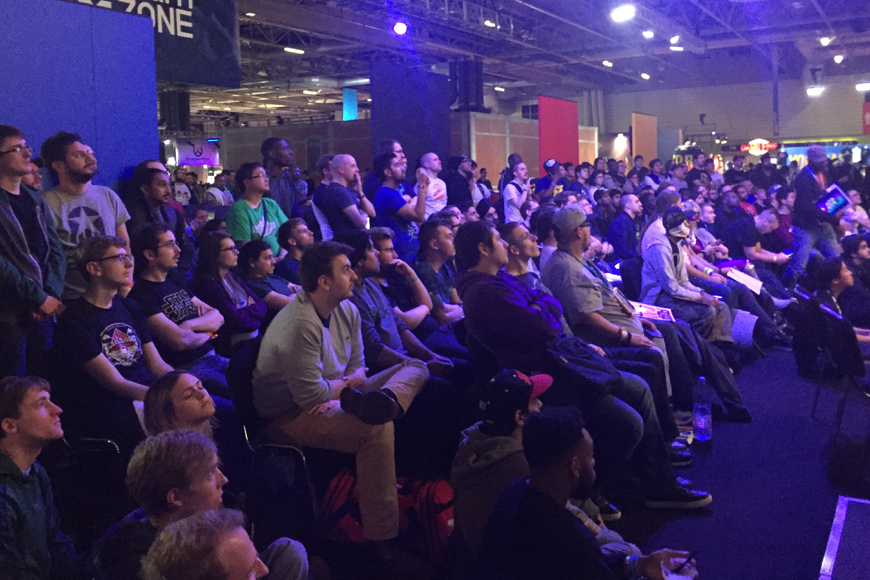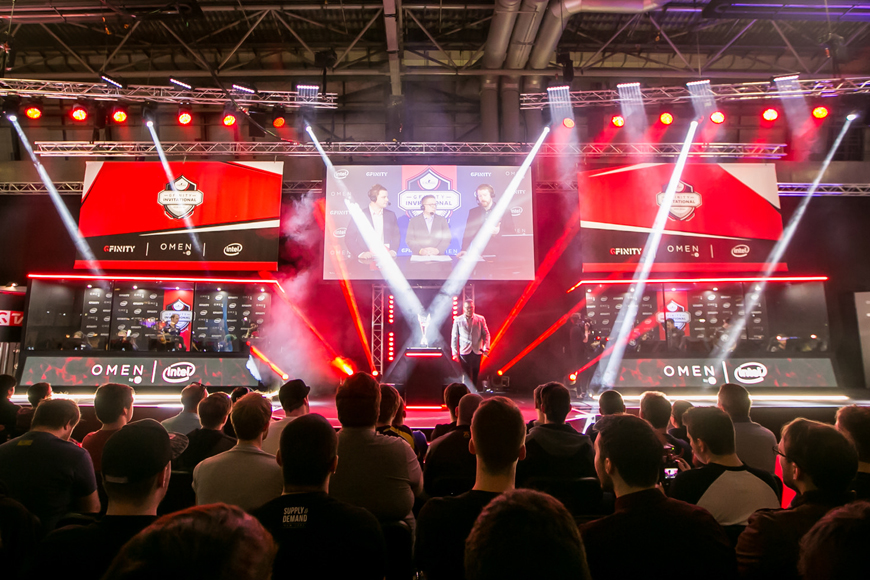Gfinity revealed more details around its Challenger Series and Elite Series tournaments earlier this week, which aim to help amateur players go pro.
As players compete in the Challenger Series and rise up the rankings, eight pro teams in the Elite Series will be able to bring an amateur player into their roster.
But how will this work exactly? And should UK orgs be worried they may lose all their best players? We ask Gfinity’s director of esports PAUL KENT in this exclusive interview.
ENUK: When a player moves up the Challenger Series rankings and gets picked up by a top team, is that just for the Elite Series or will the org take them on board in other competitions as well?
Paul Kent: When they progress and if a player is lucky enough to be drafted into an elite team, the team will add them to the roster for that season of the Elite Series, then it’s up to the player to force their way into the team, so that the team wants to keep them long-term.
I think the great thing about Challenger Series is what we’ve said is, if you’re good enough, we’ll give you the platform to show off your talent. And if you deliver and take the opportunity, then the next step is world championships.
We’re not stopping any of the teams taking part in anything else. Each team that takes part in the Elite Series is free to take part in any other competition.
All we’re doing here for players is giving them an opportunity in the UK for the first time to have a chance to play a full season with an elite team. And if they’re good enough, then it’s up to them.
We’ve heard that some UK teams are taking part in this. How will that work? Will it be a full amateur UK org or mix teams, or player 1v1s?
We are indeed speaking to a few UK teams, we feel it’s important to see traditional UK teams represented. I myself have been involved in UK esports since 1996, I played for teams like 4Kings and so on.
To me it’s really important to see the old school (to coin an old phrase) UK teams represented.
Once you make the roster for a franchised team, you’re eligible to play the weekend matches, but during the week you can still play for your amateur team.
“If a player is lucky enough to be drafted to a franchise team, we’ll be giving the amateur team they play for a payment for that player.”
Think of it like South African rugby, where players player for an amateur team in the Currie Cup but they also play for a Super League team on the weekend.
So if you play Rocket League, every Sunday you’ll be playing at the Gfinity Arena. Each team has to have a squad, it’s not just three players. Each squad will be slightly bigger, so if your team picks you for the weekend, you’re free to practice and do whatever else in the week.
We don’t want to control anyone, we want to give them the opportunity, we don’t want to shut the doors on anyone. We’re not looking for exclusivity from anyone.
Also, if a player is lucky enough to be drafted to a franchise team, we’ll be giving the amateur team they play for a payment for that player.
Is that a fixed amount for the smaller UK orgs? How much is it?
There’s two fixed amounts. There’s a fee if a player makes the draft, then there’s an additional fee if the player gets picked by en elite team for the draft.
They are one-off fees per player, per season. The actual figure we’ll announce in the coming weeks.
In the world of competition, it’s natural that the big heavyweights – your Man Uniteds etc – come in and take younger players. In traditional sport, the smaller teams at least get a payment for it, maybe not as much as they should get for it, but it’s still a payment.
In esports, particularly in the UK, that still does not happen, so I wanted to make sure we gave back to the amateur teams as well. And they weren’t just making the players then getting nothing for it.
“In the world of competition, it’s natural that the big heavyweights – your Man Uniteds etc – come in and take younger players. In traditional sport, the smaller teams usually at least get a payment for it.”

.
Will the Challenger Series be formed of mix teams?
Yeah, theoretically. I think we have to be slightly mature about this, obviously there will be some players and teams not happy with that approach, but I think long-term Gfinity have put more into UK esports the past couple of years than anyone else.
We’ve put close to £10,000 a month into our online competitions, and we pay those prizes up front instantly, and we pay for travel and accommodation. If you carry on with online cups, that’s great, but we won’t see progress with online cups only.
We want to see progress. So hopefully, in three, four or five years’ time we see world class UK esports talent making a living, making a long-standing career out of this.
What is the criteria for the UK teams you approached?
There was no set criteria, we spoke to a lot of teams. Obviously we are going to miss a few teams. We approached as many teams as possible – some politely declined the opportunity and others took the opportunity with both hands.
To the teams that we unfortunately didn’t speak to this time, I’d say hopefully long-term if this is a success, we see no reason why there couldn’t be two, three, four or five divisions down the line.
We certainly did not want to be elitist, we did not want to have a clique about this. We reached out to a broad range of teams across multiple games. Any teams that missed out, it’s just unfortunate really.
The eight elite teams haven’t been announced yet, but can we expect the big global teams, the Fnatics of the world?
Erm (laughs), I can’t comment on speculation. Nice try though!
“I don’t want to stamp on the grassroots, because that’s the bedrock of UK esports. I’ll always champion grassroots esports because that’s where I came from.”
Some UK amateur organisations have told us they’re concerned this could lead to their best players leaving, and it could harm the grassroots scene. What would you say to them?
What I would say is I complete understand their point and their sentiments. I remember being 12 years old running a Quake World clan and I remember the trials and tribulations of getting players together, playing in a league and how fun and exciting it was building a website and seeing growth.
But I don’t want to stamp all over that, because that’s the bedrock of UK esports. What annoys me to this day is in the late ’90s we had thousands of Quake clans and almost tens of thousands of Counter-Strike clans, and it’s all disappeared. For me there’s some fundamental reasons for that happening, but that’s not what this is about.
I will always champion grassroots because that’s where I came from.
Hopefully in six months or a year or two down the line, who knows, I would love a system that goes all the way down [several leagues], but it’s going to take time. We can’t do everything at once, we’ve got to be very specific, and the Challenger Series will go through changes.
Nothing in life is perfect – you’ve got to constantly evolve. And with that evolution, we’ll start to see more engagement of the grassroots. But I share their sentiment, their frustrations, and all I can say is long-term they’re very much core to what we want to do.
And I think Challenger shows that. If you go back two years ago, Gfinity was bringing the biggest teams in esports to the UK. And we could have kept doing that and putting money into that. But that wasn’t really UK esports.
We’ve had a change in tact here, and it’s not going to happen overnight, but we’ve seen what was once in my opinion one of the best esports scenes in the world, to not a great one. And we want to turn that ship around to get it to what it should be, because the UK has some amazing talent out there.

The third game hasn’t been announced yet, do we know when that might be?
I’m not in the marketing team so I’m not involved on that side. The third game has been chosen but I don’t have sight of when that’s getting announced.
We never ever say anything publicly until we sign the contract. Historically things can take a bit longer and it might seem that we’re not engaging as we should be, but it’s purely because we don’t want to say something then not deliver on it.
“Hopefully, in three, four or five years’ time we see world class UK esports talent making a living, making a long-standing career out of this.”
Is League of Legends a game you’re looking at? Why has Gfinity not been involved in this game too much?
We’ve got a good relationship with Riot and we’ve done a few things with them. We had League of Legends on the website a few years ago. I would love for everyone to work together.
Ultimately esports is a business as well, so what we try and do is not go head-to-head with fellow UK organisations. Sometimes there’s overlaps. I think ESL UK and Multiplay do some great work with League of Legends. Ther’es no point in doing the same things. Let’s try and be a bit different.
Image source: Gfinity Flickr

Dom is an award-winning writer and finalist of the Esports Journalist of the Year 2023 award. He has almost two decades of experience in journalism, and left Esports News UK in June 2025.
As a long-time gamer having first picked up the NES controller in the late ’80s, he has written for a range of publications including GamesTM, Nintendo Official Magazine, industry publication MCV and others. He also previously worked as head of content for the British Esports Federation.


